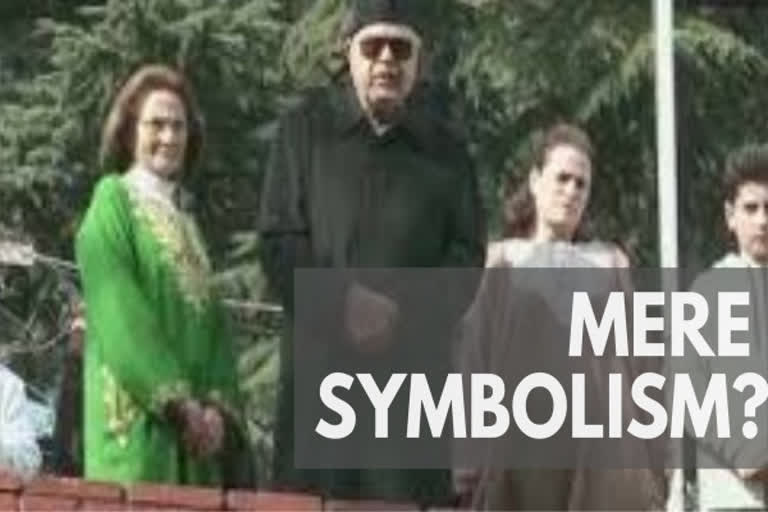New Delhi:On Friday, a beaming former Jammu and Kashmir Chief Minister Farooq Abdullah may have said “I am free” with much happiness. One could foresee that his release from detention under the Public Safety Act (PSA) was close. His release after more than seven months of house arrest indicates that the BJP-led government at the Centre may have given in to the mounting pressure and political expediencies.
Abdullah’s release was mere symbolism at display as it would not yield any tangible positives. Also, the fact that Abdullah refused to make any political statements till the time all arrested leaders including former CMs Mehbooba Mufti and Omar Abdullah are released from detention indicates a tacit understanding with the authorities.
But in the backdrop of the August 5, 2019 abrogation of Article 370, if New Delhi’s initial idea was to blunt the political importance of the 82-year-old National Conference (NC) leader, it may have achieved its purpose.
With the political space being much constricted, the future of J&K’s regional parties and the dynastic clans that dominated the politics of the Valley is in serious question. It was on the back of Article 370 that these regional parties flourished.
The political landscape of J&K is undergoing an abrupt change. Just last week, a new party—Apni Party—was launched. That it has the blessings of New Delhi is an open secret. Expectedly, its members comprise former leaders from the NC and the People’s Democratic Party (PDP), the two regional biggies.
The political space for Kashmir will be diminished immensely with the ongoing constituency delimitation exercise that will be completed within a year. With more weightage likely for the Jammu segment, the geography of J&K may even get its first Hindu CM.
On the international platform, concerns had been increasing about the Kashmir situation as also about the detained leaders.
Later this month, parliamentarians at the European Union are to vote on a resolution on the curbs in Kashmir and the Citizenship Amendment Act (CAA) that has been proposed by 626 of the 751 members of the European Parliament. A vote critical of India could be embarrassing at this stage. The Abdullah release (and possibly of other leaders in the near future) would seek to soften that criticism.
Not just the United States in a ‘polite’ nudge, but Kashmir has been figuring frequently in the United Nations (UN) and in the Organisation of Islamic Cooperation (OIC) platforms.
Just last week, a six-member OIC team visited Pakistan-Occupied Kashmir from March 2-6. The OIC, comprising 57 nations and spread over Asia, Africa, Europe, and South America, is the collective voice of the Muslim world.
On the other hand, the judiciary has been critical of the government on several counts. Legal scrutiny by the apex court is on the rise on cases like the Delhi riots, the poster ‘shame and name’ case in Uttar Pradesh and last but not the least the petition to the Supreme Court on Omar Abdullah’s detention by his sister Sara Abdullah Pilot who has challenged Omar’s detention under the PSA.
Another concern for the BJP is its prospects in the upcoming state assembly election in Bihar and West Bengal, both states with significant Muslim populations. The BJP’s shrill and divisive campaign has lowered its poll prospects. While Nitish Kumar in Bihar may use his ally the BJP’s weakness to bargain for more concessions, Mamata in West Bengal can be expected to astutely exploit the minority sentiment on the CAA and the National Population Register.
But then, a lot will depend on the maneuvers of the politically wily Farooq Abdullah.
And, in a few weeks from now, the snow in the high mountains in the border will melt. With reports of hundreds of militants waiting in their launch-pads across the Line of Control (LoC) to cross over, it can add another dimension to the developments in the militancy-hit region.
